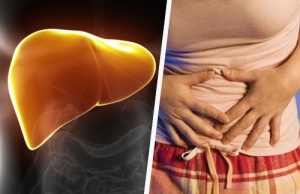Indicators of Liver Problems and How to Fight Back

It’s important to be aware of the indicators of liver problems because the liver is an organ with many different vital functions. These include eliminating toxins, fighting infections, storing vitamins and energy, and separating bile, a substance that promotes digestion.
Additionally, it’s important to take good care of your liver because it cleans your blood. It’s important to take good care of it. With that in mind, we should take indicators of liver problems very seriously.
You might like: How to Take Care of Your Liver with 5 Natural Remedies
Liver problems can arise for several reasons, causing our liver to no longer work efficiently and effectively. The most common causes of liver problems are excessive consumption of alcoholic beverages or poorly cleaned foods, and certain diseases.
It is important to remember that the immune system could attack the liver. When this happens, you become a target for infections and other health problems. That’s why it’s crucial to know the signs that could indicate an unhealthy liver.
Potential causes of liver problems
The following could disrupt normal liver function, damage your liver and increase your potential for liver problems.
- Taking too much of a certain medication or too many different medications
- Being on a certain medication for long periods of time
- Having a family history of hepatic diseases
- Regularly consuming more than five alcoholic beverages per day
- Taking heart or diabetes medication
Possible indicators of liver problems
- Poor digestion or constipation
- Abdominal swelling, pain and loss of appetite
- Bloating or fluid retention
- Nausea, especially after eating greasy foods
- Irritable bowel syndrome
- Gallbladder diseases and gallstones
- Depression, changes in mood, poor memory
- Chronic fatigue or asthma
- High blood pressure or headaches
- Unstable blood sugar levels
- High body temperature
- Low tolerance to medications such as antibiotics
- Skin and eyes turn yellowish or suffer from irritation, itching, inflammation or infection
- Bad breath or white spots on the tongue

What if I have these symptoms?
If you have any of the previously mentioned symptoms, you should visit a physician for an evaluation.
Meanwhile, refrain from drinking alcoholic beverages, soft drinks, seasoned foods, sausage, and fried foods. Later, follow the necessary health measures and parameters set by your doctor to prevent any disease from interfering with your organ functions.
On another note, there is a greater risk for liver disease if you suffer from diabetes, consume excessive amounts of alcohol, are obese, or have tattoos (from using unsterilized needles). Additionally, there is an increased risk if you work or have worked in laboratories that deal with blood, viruses, bacteria or harmful chemicals.
How can I take care of my liver?
Personal health is your own responsibility which is why it is important to pay attention to your body’s warning signs.
You should eat if you are hungry and, similarly, you should not make yourself eat if you are full. When you overeat, you make your liver work too hard and you could get sick.
Drink 8 to 12 glasses of water a day because it aids the detoxification process and also helps clean the kidneys. Likewise, avoid consuming large quantities of sugar. The liver is responsible for converting excess sugar into fat and cholesterol, both of which negatively affect your body’s functions.
You might like: Liver Cleanse Diet

If you want to have a healthy liver, you should avoid consuming a lot of artificial sweeteners. Your need a certain amount of sugar in your blood, but this can come from fresh fruit or natural sweeteners such as stevia.
Additionally, don’t overwork the liver or expose it to infections by eating improperly cleaned vegetables with chemicals and pesticides.
It’s very important to not ignore indicators of liver problems and seek medical attention if necessary.
All cited sources were thoroughly reviewed by our team to ensure their quality, reliability, currency, and validity. The bibliography of this article was considered reliable and of academic or scientific accuracy.
- Hochleithner, M., Hochleithner, C., & Harrison, L. D. (2005). Evaluating and Treating the Liver. . . Clinical Avian Medicine, 441–9. https://doi.org/10.1002/cphy.cp110117
- Flora, K., Hahn, M., Rosen, H., & Benner, K. (1998). Milk thistle (Silybum marianum) for the therapy of liver disease. The American journal of gastroenterology, 93(2), 139-143.
This text is provided for informational purposes only and does not replace consultation with a professional. If in doubt, consult your specialist.








